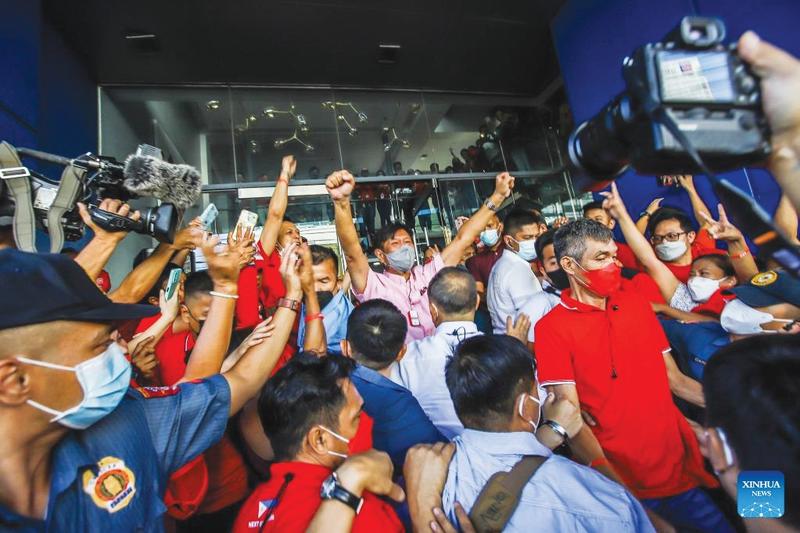 President-elect Ferdinand Marcos Jr greets his supporters at the campaign headquarters in Mandaluyong city, the Philippines on May 11. (STR / XINHUA)
President-elect Ferdinand Marcos Jr greets his supporters at the campaign headquarters in Mandaluyong city, the Philippines on May 11. (STR / XINHUA)
Ferdinand Romualdez Marcos Jr won a landslide victory in the Philippine presidential election on May 9 as voters pinned their hopes on him to bolster the economy amid the COVID-19 pandemic.
Marcos, 64, son of former president Ferdinand Marcos, secured over 30 million votes, according to unofficial data released by the Commission on Elections on May 10. In the first win by a majority in presidential elections in the country since 1986, Marcos beat his main rival, incumbent Vice-President Maria Leonor Robredo.
Analysts said nostalgia for the Marcos era, combined with the election of Rodrigo Duterte as president in 2016, had stoked the enthusiasm of many Filipinos for a “strongman” as leader.
In an interview with China Daily, Jayeel Cornelio, director of the development studies program at Ateneo de Manila University, said Filipinos’ support for “Bongbong” Marcos stemmed from a widespread belief “that he is the embodiment of his father and that the father was a successful president”.
Jean Encinas Franco, associate professor of political science at the University of the Philippines, said: “Duterte himself paved the way for the candidacy and eventual presidency of Marcos Jr.”
She alluded to Duterte’s hard-line campaign against illegal drugs, noting that when Duterte won in 2016, it seemed that “strongman leaders have become acceptable again”.
Duterte did not endorse any candidate in the elections. But his daughter, Sara Duterte, who once served as mayor of the southern city of Davao, ran as vice-president on the Marcos ticket. Like Marcos, Sara was set for a landslide win, getting over 31 million votes according to the unofficial tally.
Manuel L. Quezon, a columnist for the Manila-based broadsheet Philippine Daily Inquirer, wrote in a newsletter that the verdict on the 2022 elections is that it was “signed, sealed and delivered” after former president Gloria Macapagal-Arroyo brokered the Marcos-Duterte coalition.
Franco said opposition leader Robredo’s campaign focused on “transformative” governance and encouraging citizens “to be part of the solution to addressing the problems we have”.
“But for people who are frustrated and who have been on the periphery of Philippine society, they’re tired of that. They want the government to give (them) what they want,” Franco said.
Ferdinand Marcos led the Philippines for over two decades before he was toppled in a February 1986 revolt. He was hounded by allegations of plunder and human rights violations. The elder Marcos and his family went into exile in Hawaii, in the United States. He died in 1989 from kidney, heart and lung ailments.
Bongbong and his family returned from exile in the early 1990s and have remained a political force. Bongbong has served as a governor, congressman and senator.
Analysts noted that after the family returned to the Philippines they invested in a massive campaign to present the Marcos years as the Philippines’ “golden years”.
Franco said most voters believe that Bongbong “will make the Philippines great again”.
“When you are faced with uncertainties, due to the pandemic and the loss of income and livelihood and employment, then it resonates very easily, especially with members of low-income groups,” she said.
Cornelio said “the stakes are very high for the (incoming) president”.
Bongbong is “setting himself up for massive expectations”, he said, alluding to the promise to revive the economy and invest heavily in agriculture.
Xinhua contributed to this story.


